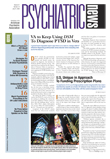General practitioners treat most of the people who have mental illness, according to a recent study. And there is an increasing likelihood that their patients include those with major mental health problems.
A comparison of two nationally representative household surveys that screened for mental disorders 10 years apart found that the use of only general practitioners when seeking mental health treatment was the fastest growing and most popular approach among the survey respondents. The study, published in the July American Journal of Psychiatry, found that respondents treated by only a general physician for any mental illness grew from 2.6 percent in a previous survey to 6.5 percent in the most recent study.
The researchers attributed that finding to the increasing role of general physicians as insurance plan “gatekeepers,” increased access to mental health screening tools, the growing popularity and safety of psychotropic medications, and the increasing use of psychotherapies by general practitioners.
One of the study authors, Harold Pincus, M.D., vice chair of strategic initiatives in the Department of Psychiatry at columbia University, said the most troubling finding was that patients with serious disorders expanded their exclusive use of general practitioners to treat their mental illness.
The increased utilization of mental health care among those with moderate mental illness—such as mild to moderate depression—bodes well for the health of the population, said the authors, because research has found that, overall, psychotherapy and medication have equivalent effectiveness. However, the increased reliance on general physicians for mental health care is more worrisome among patients with more serious illnesses in light of the increasing evidence that such illnesses respond best to combined psychotherapy and pharmacotherapy, which general practitioners are unlikely to provide.
“There is a question of whether the right people are being cared for by the right professionals,” Pincus told Psychiatric News.
The findings were based on comparisons of the assessments of mental disorders among the 5,388 respondents in the 1990 to 1992 National comorbidity Survey (NCS) and the 4,319 respondents in the NCS Replication conducted from 2001 to 2003.
The study highlighted the need for more information about what is provided within “the black box of care” —that is, what specific treatments are used and their effectiveness in improving mental health, Pincus said. More studies need to investigate whether people are getting the quality of mental health care that they need for a given condition, he said. The results concerned Pincus in light of his previous research that found an increase in the prescribing of psychotropic medications by general practitioners, who are unlikely to have training in psychotherapy.
“People are making choices for medications and are maybe less interested in psychotherapy,” he said.
Continuing stigma over treatment from a psychiatrist or mental health professional may drive some of the use of general practitioners alone for serious illnesses, he said.
The study showed that more comprehensive mental health care training is needed for primary care physicians, Pincus said. It also highlighted the need for psychiatrists to communicate better with general practice physicians and establish closer referral relationships with them so they are more aware of the types of conditions that require specialty care, he said.
“General medical care without specialty use may result in lower treatment intensity and adequacy than in specialty care,” the researchers said.
Psychiatrists were the second most common source of mental health care among the more recent survey respondents, which saw their use rise from 2.4 percent to 5.2 percent of respondents. The researchers credited this to diminished stigma, greater recognition that mental illness requires treatment, and greater demand for and availability of pharmacotherapies.
People with serious mental illness remained a minority of those who sought care from psychiatrists. The proportion of serious to less-serious cases remained the same as the overall number seeking care rose, so psychiatrists likely saw increases in both types of patients, according to the study authors.
Although patients' use of nonpsychiatric mental health clinicians, without first consulting with their primary care physician, grew from 3.6 percent of respondents to 4.3 percent, the authors had expected more substantial growth in this area.
“Given the fact that there has been a growth in the supply of nonphysician mental health providers, we might have expected to see more of that,” Pincus said.
Major decreases in the use of psychotherapy alone to treat mental illness continued in the most recent survey, a situation the authors attributed to both tighter insurance coverage and the growing popularity of psychotropic medications.
